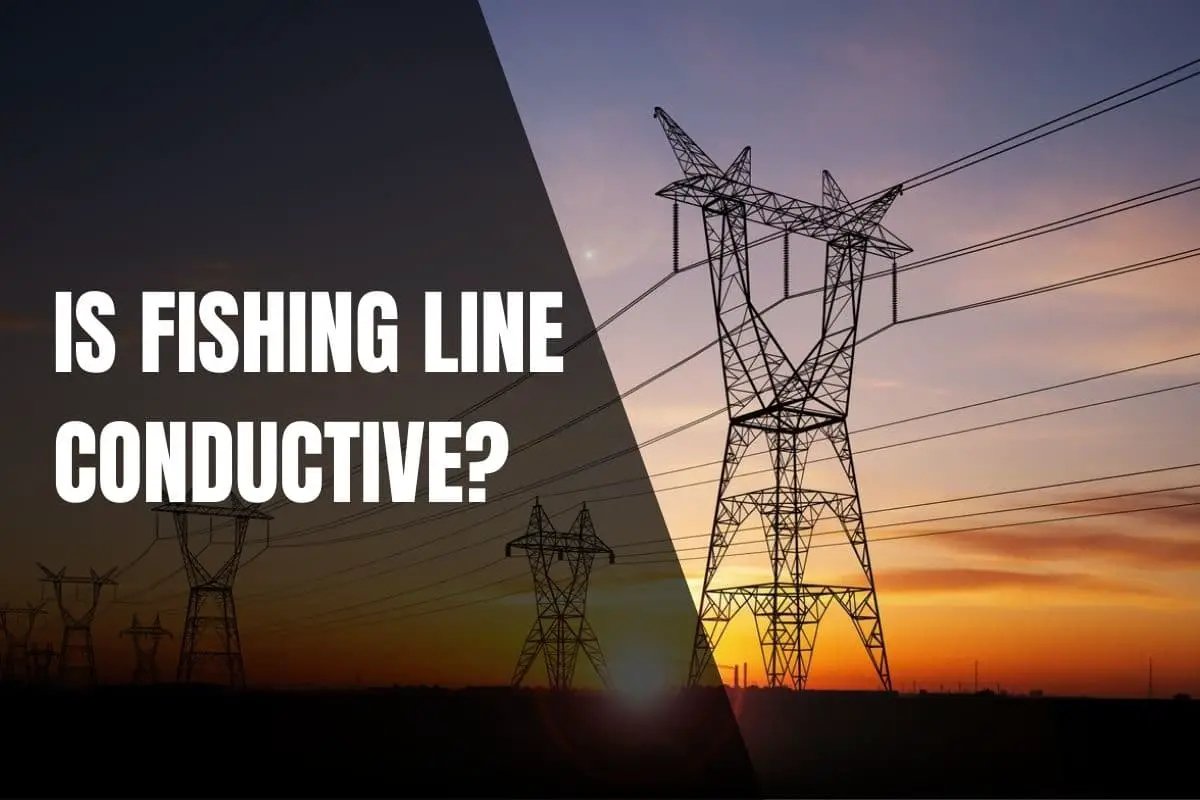Electrical transmission structures and pipelines are everywhere, even underwater. You can find submarine power cables in the ocean as well as some large lakes and rivers. It isn’t always clear for an angler if a body of water contains electrical hazards like underwater cables. To determine whether they are a threat, one must ask: does fishing line conduct electricity?
Yes and no. Braided fishing lines are conductive, but most types are not. Even though monofilament and fluorocarbon line is non-conductive, hooking a cable is still dangerous. Let’s discuss the science of fishing line materials and conductivity and how you, the angler, can protect yourself against it.

What Makes Fishing Line Conductive or Non-Conductive?
There are a handful of different materials that fishing companies prefer for lines. Ultimately, conductive materials in your equipment will increase the risk of electrical shock. Here are some of the most common components of fishing line and their susceptibility.
| Material | Can It Conduct Electricity? |
|---|---|
| Nylon | No |
| Polyvinylidene Fluoride (PVDF) | No |
| High-density polyethylene (HDPE) | No |
| Polypropylene | No |
| Spectra | No |
| Dyneema | No |
| Dacron | No |
As the table shows, the most-used fishing line materials are not conductive. So what could make a fishing line conduct electricity and turn into a hazard?
Primarily, this is from a braided fishing line. Braided lines can sometimes have steel woven into them or covering the line from the outside. Though most fishing lines won’t conduct electricity, steel certainly will, and this can spell a dangerous disaster for the unsuspecting angler.
If you aren’t completely certain on exactly what the material of your line is, just assume it’s conductive. Even if you do know your line won’t conduct electricity, you should put as much distance between yourself and electrical lines as possible. Freak accidents happen, and no one wants their last thought to be, “this is fine; my line’s made of nylon.”
What You Don’t Know About Non-Conductive Materials
Unfortunately, non-conductive does not automatically mean “safe.” Ions conduct electricity, so materials with high ionic compounds will likely conduct electricity.
To be completely clear, non-conductive does not mean “electricity proof.” There are still plenty of other hazards to be aware of. Knowing the exact resistance of a product in ohms is virtually impossible as it depends on many different factors, including
- Size
- Construction
- Quality
- Purity of materials
- Age
- Wear
- Application
Check your fishing line to see if there’s an exact resistance given. If not, consider contacting the manufacturer so that you know the exact resistance in ohms. You could compare two brands of the same type of line and have different answers, so research is essential.
Non-Conductive Fishing Lines vs. High Voltage: What Happens
Not conducting electricity does not make non-conductive lines safe to toss into an electrical plant. In most cases, you shouldn’t suffer any harm if your line accidentally hits a power plant unless everything on your rod and line conducts electricity.
High-voltage or high-amperage currents can overwhelm the electrical resistance of a material. When this happens, the electricity is free to flow. Resistance can also cease to matter if, for example, your line and rod are completely drenched. Water conducts electricity extremely well, and it can flow into you that way.
How Does Voltage and Amperage Cause Injury?
Did you know that your skin is also resistant to electricity? Unfortunately, that resistance isn’t very high. A high enough voltage will help a current pass into your body and past your skin. That’s why small jolts like a frayed wire might sting, whereas sticking a fork into your toaster will have a different effect. Here’s a quick guide to the severity of shocks and the effect on your body.
| Current | Effect On Human Body |
|---|---|
| 5 milliamps or less | Mild shock, somewhat painful |
| 6-30 milliamps | Painful shock, restricted muscle movement |
| 50-150 milliamps | Extreme pain, possible death |
| 1-4.5 amps | Nerve damage, muscle control loss, likely death |
| 10 amps | Cardiac arrest, severe burns, probable death |
| 15 amps | The current is strong enough to trip most circuit breakers. Almost guaranteed death and intense disfiguration |
| 16 amps or higher | Nearly always results in death. |
How to Protect Yourself From Being Shocked
Now that you know about electrical threats, how can you stay safe? Here are some of the best ways to keep yourself from becoming the fish you want to fry next time you go for a catch.
Protective Gear
Rubber is one of the best materials for stopping an electrical current. That’s why so many tools have rubber handles and why many wires are coated in rubber or have rubber stoppers.
At the very least, you should wear rubber gloves as this can stop the electricity from transferring from the rod into your hands. Rubber boots are also a solid option so that a wire doesn’t hit the ground and go into your feet.
It’s important to note that if the current gets into you, rubber won’t matter. Don’t wear a pair of rubber gloves and then wade pantsless into a lake with an active power line. All you’ll do is electrocute yourself while wearing nice gloves.
Ways to Ground
Grounding yourself is another good way to prevent harm from electric currents. For example, most cars or trucks are grounded, making it so that they can take a lightning strike and redirect it to the ground. Staying near your car is a good way to stop yourself from getting shocked, though it won’t necessarily save your life if you’re electrocuted directly.
Boats are less grounded, especially small sloops or Jon boats made of metal. However, if your boat is made of inflatable rubber and you drop your rod fast enough, the current will not transfer from your boat to you.
Worst Case Scenario
If you hook a power line while fishing, don’t panic! Let go of your rod as soon as possible, even if you’re wearing rubber gloves. Afterward, cut your line with a rubber-handle tool and abandon the line. Do not attempt to remove your line from the electrical wire.
Happy Fishing & Tight Lines
